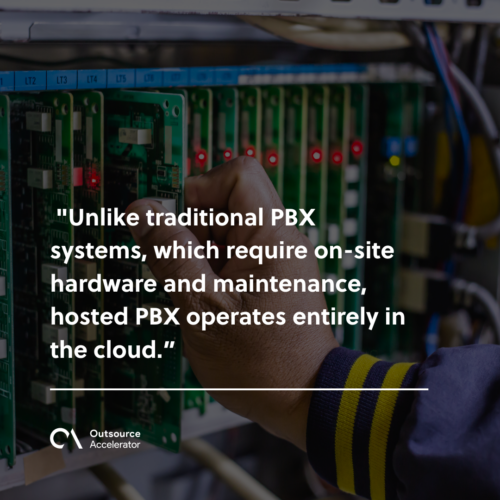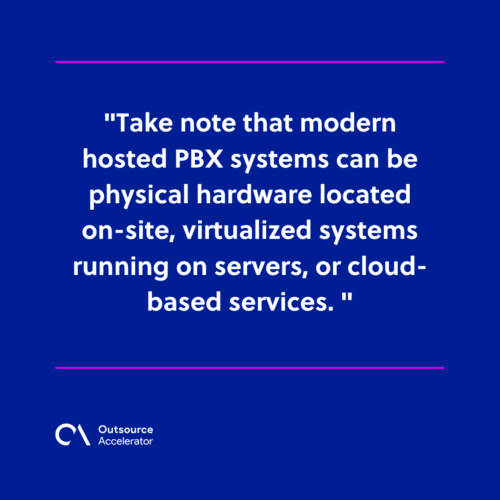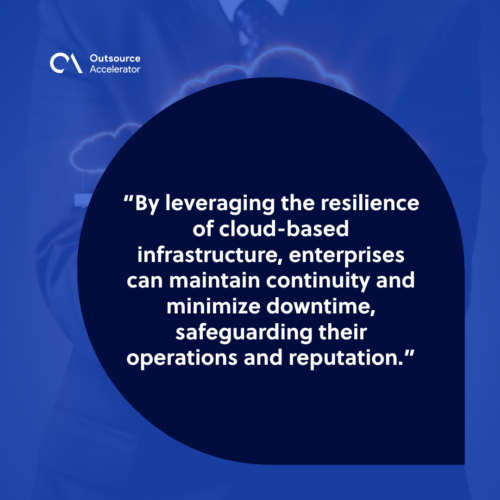What is a hosted PBX?

Traditional phone systems are gradually being replaced today due to several factors. One significant reason is their limitations in meeting the evolving needs of modern businesses.
Older phone systems often require costly hardware installations, maintenance, and upgrades, which can be cumbersome and inflexible. Additionally, they lack the scalability and agility offered by cloud-based solutions like hosted PBX.
If call center services stay with traditional phone systems, they may face numerous challenges.
These include limited scalability to handle fluctuating call volumes, inefficient call routing and queuing, and higher operational costs associated with hardware maintenance and upgrades.
This article introduces hosted PBX phone systems, exploring their functionality, benefits, and best features.
What is a hosted PBX phone system?
A hosted PBX phone system is short for Private Branch Exchange. It represents a modern telecommunications solution that revolutionizes the way businesses manage their phone systems.
Unlike traditional PBX systems, which require on-site hardware and maintenance, hosted PBX operates entirely in the cloud.
Through this service, all call routing, voicemail, and other telephony features are managed remotely, with data stored securely in the cloud.

How hosted PBX phone systems work
Hosted PBX phone systems operate by routing calls through the provider’s data centers, eliminating the need for physical infrastructure on-site.
Here’s how this modern phone system specifically works:
- Incoming calls – When an external call is made to the organization’s main phone number, the PBX system receives it. The PBX routes the call based on predefined rules. These rules allow callers to choose extensions or departments.
- Internal calls – If the call is for an internal extension, the PBX system routes it directly to the intended recipient’s phone. This internal routing is done without going through the public phone network.
- Call routing – Hosted PBX systems use various methods for call routing. It can be based on the dialed number, the time of day, the availability of recipients, or other criteria set by the organization.
- Extensions – Each user within the organization is assigned an extension number. This allows for easy internal communication without having to dial external phone numbers.
- External calls – For outgoing calls, users can dial an access code (usually 9) to reach an outside line. The PBX system then connects the call to the public telephone network.
- Administration – Administrators manage the PBX system settings, including adding or removing extensions, setting up call routing rules, configuring voicemail, and monitoring call activity.
Take note that modern hosted PBX systems can be physical hardware located on-site, virtualized systems running on servers, or cloud-based services. The choice depends on the organization’s needs, budget, and preferences.

Features of a hosted PBX phone system
Here are some of the best features of a hosted PBX phone system:
Auto attendant
An auto attendant feature greets callers and directs them to the appropriate extension or department using pre-recorded messages or interactive voice prompts.
This automation reduces the need for manual call routing, improving efficiency and enhancing the caller experience.
Unified communication
Hosted PBX systems integrate various communication channels, including voice calls, video conferencing, instant messaging, and email, into a unified platform.
This convergence facilitates seamless collaboration and enhances productivity by enabling employees to communicate effectively from anywhere at any time.
Call forwarding/recording
With call forwarding capabilities, users can redirect incoming calls to alternative numbers or devices, ensuring uninterrupted communication even when they’re away from their desks.
Additionally, call recording functionality allows businesses to archive conversations for training, compliance, or dispute resolution purposes.
Customizable greetings
Hosted PBX systems allow users to customize greeting messages for different scenarios, such as business hours, holidays, or special events.
This personalization reinforces brand identity and ensures that callers receive relevant and informative messages tailored to their needs.
Benefits of a hosted PBX phone system
Now let’s head on to the significant benefits that a hosted PBX phone system offers:
Improved customer service
Hosted PBX systems contribute significantly to enhancing customer service by streamlining call handling processes and integrating advanced features such as auto attendant and call queuing.
For instance, consider a scenario where a customer calls a retail business with a query about a product. With an auto attendant feature, the customer is greeted with a professional message that guides them to the appropriate department based on their inquiry.
Efficient call handling
Hosted PBX systems excel in optimizing call routing and distribution, thereby reducing wait times and mitigating the risk of missed calls or lost opportunities.
For example, a busy sales team receiving multiple incoming calls can access advanced call management features like simultaneous ringing. It routes calls to available representatives automatically.
Increased productivity
Hosted PBX systems empower employees to communicate and collaborate more effectively, regardless of their physical location.
Features such as unified communication, mobile integration, and collaboration tools let businesses adapt to remote work trends and changing market conditions.
Enhanced business continuity
The hosted PBX phone system offers built-in redundancy and disaster recovery capabilities. It ensures uninterrupted communication even in the event of hardware failure, natural disasters, or other unforeseen disruptions.
By leveraging the resilience of cloud-based infrastructure, enterprises can maintain continuity and minimize downtime, safeguarding their operations and reputation.

How to choose the right hosted PBX provider
When selecting a hosted PBX provider, businesses should consider several factors to ensure compatibility, reliability, and value for money:
- Assess the provider’s feature set and ensure it aligns with your business requirements, both present and future.
- Choose a provider that offers scalability to accommodate your growing needs and flexibility to adapt to changing circumstances.
- Verify the provider’s security protocols, encryption standards, and compliance certifications to protect sensitive data and ensure regulatory compliance.
- Consider the provider’s customer support offerings, response times, and SLAs to ensure timely assistance and resolution of issues.
Overall, a hosted PBX phone system represents a cost-effective, flexible, and feature-rich solution for businesses looking to modernize their communication infrastructure.







 Independent
Independent




